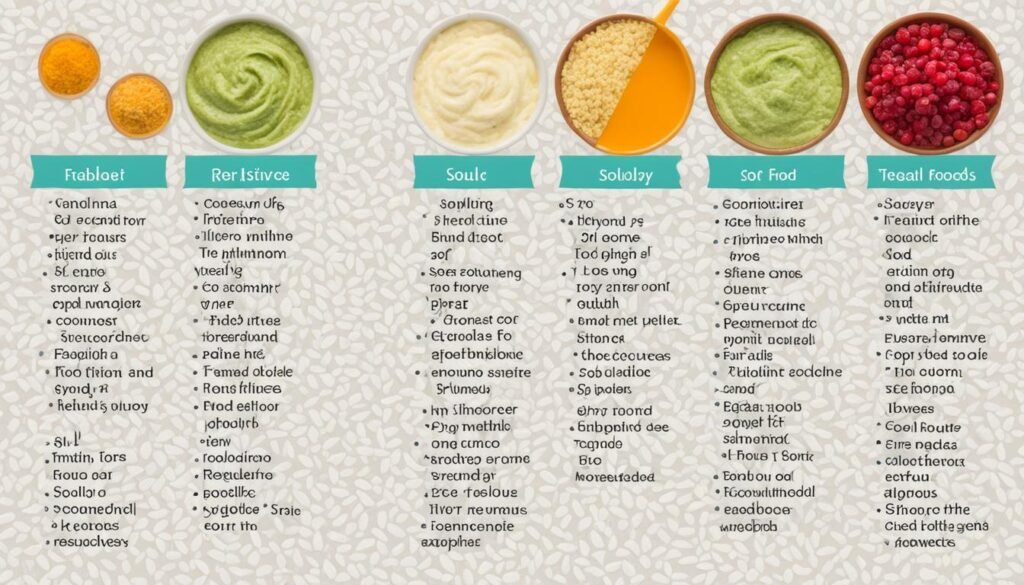
Deciding to have bariatric surgery marks a big point in improving your health and losing weight. Before the surgery, you need to commit to a new way of living and a diet plan. After the surgery, sticking to a balanced diet is key to staying healthy and keeping the weight off. This guide will help you with what to eat before surgery, what to eat after, and how to succeed in the long run.
Pre-Operation Diet and Weight Loss
Before bariatric surgery, you must follow a pre-operation diet. This phase helps you lose weight and learn healthy eating habits. It starts about three months before your surgery.
The main goal here is to drop pounds and change how you eat for the better. You’ll work with a dietitian to create a plan that’s just for you. This plan will focus on eating the right amounts, the “MyPlate” concept, and adding daily exercise.
During this phase, you’ll pick up good eating habits. You’ll learn to pick foods that are packed with nutrients and control how much you eat. You’ll also tackle emotional eating. Doing these things will help you set a solid base for life after your operation.
Behavior Modification for Lasting Results
- Practice mindful eating techniques, such as eating slowly and savoring each bite.
- Adopt portion control strategies, measuring your food and using smaller plates.
- Identify trigger foods and develop strategies to manage cravings and emotional eating.
- Establish a consistent meal schedule and avoid skipping meals.
- Engage in regular physical activity to support weight loss and improve overall fitness.
The pre-operation diet and behavior changes are key to your surgery success. Following the pre-surgery diet helps in losing weight and be ready for the surgery.
Fueling Weight Loss Through Healthy Eating
Losing weight before surgery is all about eating right. Go for a diet with lots of fruits, veggies, lean proteins, whole grains, and good fats. Aim for foods full of vitamins and minerals, while cutting back on sugar and processed foods.
Having a strong support group is vital. Surround yourself with people who cheer you on. Joining groups or talking to a therapist can help with any feelings that make you eat the wrong way.
Preparing for the Surgery: Full Liquid Diet
About a week before your surgery, you’ll start a full liquid diet. This diet is all about low-sugar, low-fat, high-protein liquids that go down easy. Its main job is to shrink the liver, making the surgery process smoother.
You’ll have plenty to choose from on this diet. It keeps you nourished without overworking your digestion. Here’s what you can enjoy:
- Clear liquids such as broth, tea, and water to stay hydrated.
- Protein drinks or shakes to ensure your body receives the necessary protein.
- Sugar-free popsicles and gelatin for a satisfying and refreshing treat.
- Caffeine-free beverages like herbal tea or decaffeinated coffee to avoid stimulation of the digestive system.
This full liquid diet does a lot. It gets your body ready for surgery and cuts down on risks. Plus, it makes your liver safer to work on. By sticking to low-sugar, low-fat, high-protein drinks, you help your body in two ways. You get key nutrients and go easy on your stomach.
Don’t forget to talk to your doctor or a dietitian, too. They can give you advice that fits your own needs. This can make the full liquid diet work better for you.
Post-Operation Diet: Phases and Progression
After bariatric surgery, a well-thought-out post-op diet is key for good health. It helps in your weight loss journey. This diet has different stages, each with its own rules and food suggestions. As your stomach heals, you’ll adjust to your new eating routine.
Phase 1: Clear Liquid Diet
The first stage of the diet is a clear liquid one. It lasts only a few days after your operation. You drink things like water, broths, and sugar-free gelatin during this time. Avoid carbonated drinks and those with caffeine or lots of sugar.
Phase 2: Full Liquid Diet
The full liquid diet is next, lasting about two weeks. You’ll include things like protein shakes and strained soups. Remember, it’s important to drink plenty of water and focus on items high in protein.
Phase 3: Pureed Diet
After liquids, you move to pureed foods. This step goes on for 2 to 4 weeks. Blended soft fruits and well-cooked vegetables are some options. Stick to things that are smooth, avoiding foods that are chunky or hard to digest.
Phase 4: Soft Diet
Next is the soft diet, lasting around 4 to 6 weeks. You’ll eat foods that are easy to chew, like tender meats and cooked vegetables. It’s crucial to chew well and only eat when you’re really hungry.
Phase 5: Regular Bariatric Diet
The last phase is a life-long change to a healthy diet. This diet is about balance and includes lean proteins and lots of fruits and veggies. Paying attention to portion sizes and eating mindfully are big parts of this stage.
The time it takes to move from one stage to the next can change. It depends on your surgery type. Your healthcare team and dietitian are there to help and make sure you’re on track.

| Phase | Recommended Foods |
|---|---|
| Clear Liquid Diet | Water, broths, sugar-free gelatin, herbal tea |
| Full Liquid Diet | Protein shakes, low-fat dairy products, strained soups, smoothies |
| Pureed Diet | Soft fruits, well-cooked vegetables, lean ground meats, cottage cheese |
| Soft Diet | Tender meats, cooked vegetables, soft fruits, legumes |
| Regular Bariatric Diet | Lean proteins, whole grains, fruits, vegetables, healthy fats |
Stage-by-Stage Guide to the Post-Operation Diet
After bariatric surgery, following a good diet is crucial. The diet aids in healing and boosts weight loss. There are several stages in this diet, each with its own food list, goals, and advice. Sticking to these steps will help you move forward easily while staying healthy. Let’s go through each stage.
1. Clear Liquid Diet
The first step is the clear liquid diet. You’ll drink clear liquids like water, broth, and herbal tea. This helps keep you hydrated and allows your stomach to get used to its smaller size. Remember to drink slowly and skip carbonated, sugary drinks. You’ll stay on this step for a few days after surgery.
2. Full Liquid Diet
Next, you’ll progress to the full liquid diet. This means adding thicker liquids, such as protein shakes and smooth soups. The aim is to get key nutrients and protein in a liquid form. As always, take your time and dodge sugary or greasy drinks. This step lasts for two weeks.
3. Pureed Diet
Afterwards comes the pureed diet phase. Pureed food should be the texture of pudding and rich in protein. Think pureed lean meats, vegetables, and soft fruits. Chew slowly and take small bites. You’ll be on this diet for about four weeks.
4. Soft Diet
Now, you’re ready for the soft diet. You can start to eat foods that are soft and easy to chew. This includes cooked veggies, tender meats, and soft grains. Remember, portion control and thorough chewing are key. This diet step lasts for roughly six weeks.
5. Regular Bariatric Diet
Finally, you’ll reach the regular bariatric diet. You can eat more types of food, like solid proteins, fruits, and whole grains. Still, aim for lean proteins, watch your portions, and avoid fatty or sugary foods. Eat slowly and only until you’re full. This diet is for life, keeping you healthy for the long run.
There are some key tips to remember for each diet stage:
- Drink lots of water to stay hydrated.
- Chew well and take your time with each bite.
- Choose lean protein to help with healing.
- Avoid foods high in fat and sugar.
- Always watch how much you eat.
- Stop eating when you’re full; listen to your body.
Following the diet stages with the right foods, goals, and advice will help ensure good healing, weight loss, and long-term victory.
Importance of Behavior Modification and Compliance
After bariatric surgery, it’s vital to change how you eat. Simple habits, like eating small amounts, chewing slowly, and stopping when you’re full, really matter. The people around you should encourage your efforts to get healthier.
Changing how you view food and eat is at the heart of this process. It helps form a better connection with what you eat for the long run. Focusing on eating smaller portions means you’ll avoid overeating, helping you lose weight.
Eating slowly helps you enjoy your food more and notice when you’re full. Pay attention to how your body feels to keep from eating too much. Chewing well and pausing between bites is good for digestion and keeps you from feeling stuffed.
Knowing when to stop eating because you’re full is key. Learn to listen to your body and stop when you feel satisfied. This skill is crucial for keeping your weight in check and avoiding extra pounds.
Listening to your healthcare team is also essential. Do what they say about diet, medication, appointments, and exercise. This helps your surgery be as effective as possible and reaches your weight loss targets faster.
Having support matters a lot on this journey. Those who cheer you on and understand your aims are crucial. This could be through support groups, counseling, or with your family. It keeps you motivated and helps you overcome any difficulties.

Conclusion
The diet before and after bariatric surgery matters a lot for weight loss success. By sticking to your diet plans before and after surgery and making changes to your behavior, you can keep the weight off. Remember, bariatric surgery is a help, not the only answer to weight loss.
Talk to your doctor and a dietitian to get personalized advice during your journey. They’ll help you figure out what to eat, how to maintain your weight, and how to deal with any problems.
You need a good support system, too. Friends, family, or support groups that know what you’re going through and keep you motivated are invaluable. Doing it together makes the road to a healthy weight much smoother.




